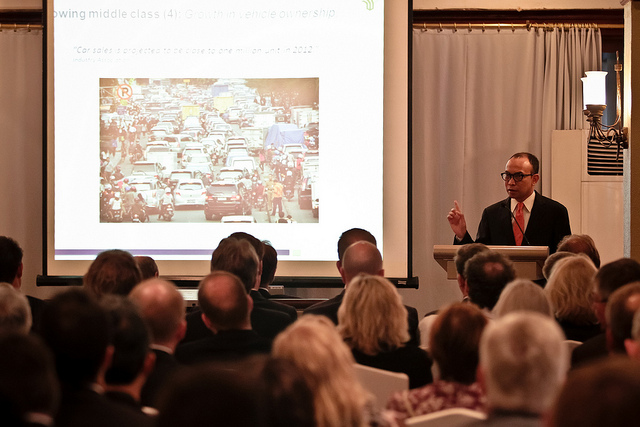
Over the past 50 years there were many times when Australia and Indonesia found it difficult to talk to each other about politics, strategy or diplomacy. We’re having another episode now. Economics, though, has always been firmer ground when other areas shut down.
Thus, the 50th anniversary of the
Australian National University’s Indonesia Project next week is about a lot more beyond economics. It’s interesting people working connections between two of the most different neighbours in the world.
Some of those turning up for the anniversary celebration tell that story: the former Foreign Minister, Gareth Evans; the secretary of Foreign Affairs, Peter Varghese; former Indonesian Vice President Dr Boediono; former Indonesian Minister of Finance Dr Muhamad Chatib Basri; and former Indonesian Trade Minister Professor Mari Pangestu. It’s a fascinating cast reflecting an unusual story of 50 years of common purpose by Australia and Indonesia.
When Heinz Arndt took over as head of the new Economics Department at the ANU’s Research School of Pacific Studies in 1963, he quickly made Indonesia a major project.
It was a brave moment for such vision. As
Arndt’s Story recalls:
Almost everyone he consulted advised against the effort. It was, after all, the time when Sukarno’s ‘Guided Democracy’ was in full flower and the Indonesian economy was in tatters. Moreover, Indonesia was in its state of confrontation – Konfrontasi – with Malaysia. The prospect of the ANU obtaining high-level cooperation for research in Indonesia was faint; it was unlikely that research workers would be admitted to the country.
After Arndt made an explanatory visit to Indonesia in late 1964, the adventure was launched the next year with the creation of the
Bulletin of Indonesian Economic Studies: ‘From 1965 until Heinz’s retirement from the university in 1980, Indonesia was the main focus of the department.’
The coming of Suharto and the regime’s hunger for economic research and advice meant Jakarta quickly became a rich hunting ground for economists (Harvard, the IMF and the World Bank).
The ANU maintained an important place in the Indonesia development discussion by giving graduate students extended periods of field work in Indonesia; and the sustained influence of the
Bulletin of Indonesia Economic Studies.
The Indonesia Project was always about people power. Anwar Nasution, the former Dean of Economics at the University of Indonesia and former Auditor General of Indonesia, said the Project and the Bulletin rate as ‘valuable assistance’ from Australia helping teach Indonesian scholars and ‘sharpen the economic policies of Indonesia.’
Pause to consider in what other area Indonesia would be willing to give such praise? Or even accept Australia might have something to teach.
Peter McCawley, who headed the Project from 1981 to 1985, said it added a bit of the much discussed ‘ballast’ to the relationship and (ah, productivity) ‘at a very low cost.’
In 1983, Jamie Mackie and Peter McCawley started the annual Indonesia Update. McCawley said the Update has become ‘a quite remarkable affair...It has grown and grown. It’s now the top international annual academic and public meeting on Indonesia (outside of Indonesia, of course).’
Professor Hal Hill, who headed the Project from 1986 to 1998, speaks of the dreams it reflects. The Project was born when Australian academics ‘could afford to ‘dream big’, and when support for Asian studies was generous and rising.’ He sees the Indonesia Project as ‘one of Australia's most audacious intellectual ventures.’
The audacity rested on a dream about what Indonesia could become, a dream that looked more like a nightmare in 1965:
How could serious work commence on the Indonesian economy when hardly any of its economic statistics were credible, when Indonesia had disengaged from the global community, and when its economists were completely sidelined?
The continuing evolution in the Project, Hal Hill said, is the way that it is being Indonesianised with ‘[l]eadership gradually passed to a second generation, of Arndt's former students…The deep ties between the Project and its many Indonesian graduates and research collaborators are one of the strongest and most durable bridges in a bilateral relationship that, sadly, continues to experience considerable volatility.’
Volatility, indeed. The Oz–Indonesia ride is having another rollercoaster moment, with
Labor claiming the relationship is under ‘unprecedented strain’ and at its ‘lowest point’ in decades.
The previous
Indonesian Foreign Minister, Marty Natalegawa, said the two governments aren’t even talking:
We have in the past difficult moments when our relations are low but even then I believed that there was always a sense of communications going, actually from my experience in the past whenever we had a crisis communication intensified. I'm not sure whether that sort of communication is going on at the moment, whether public or private.
No problem, was the response of the
Foreign Minister, Julie Bishop, to Natalegawa. She thinks relations are at an 'all time high'.
The Australian business community response is that if this is a high,
what does low look like?
The argument that can run all over the shop, and it usually does. History says the highs between Jakarta and Canberra are not as sustained as they should be, while the lows arrive too frequently. Salute 50 years of the Indonesia Project—there’s a lot more yet to be done.
 Print This Post
Print This Post